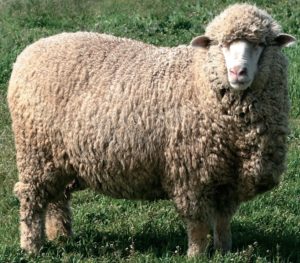 Among the variety of sheep breeds bred by humans, Merino sheep occupy a special place. Their value was understood by the Spaniards, the only producers of these animals until the 18th century. It is no coincidence that the secrets of the breed were strictly preserved, not allowing export outside the country. Other Europeans also praised their fine fleece and high quality wool. When the British defeated Spain in the 18th century, other countries also received the opportunity to breed merino sheep. Since that time, the breed has spread throughout the globe. The largest producer today is Australia; sheep are also bred in other countries.
Among the variety of sheep breeds bred by humans, Merino sheep occupy a special place. Their value was understood by the Spaniards, the only producers of these animals until the 18th century. It is no coincidence that the secrets of the breed were strictly preserved, not allowing export outside the country. Other Europeans also praised their fine fleece and high quality wool. When the British defeated Spain in the 18th century, other countries also received the opportunity to breed merino sheep. Since that time, the breed has spread throughout the globe. The largest producer today is Australia; sheep are also bred in other countries.
Today, Merinos are not only the best sheep wool; breeds have also been bred that, in addition to wool, produce tender dietary meat.
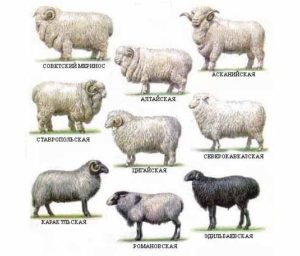 During breeding work, varieties of elite sheep have been created that have their own characteristics.
During breeding work, varieties of elite sheep have been created that have their own characteristics.
Spanish Merinos are the founders of the breed and demonstrate its characteristics:
Reference! The minimum thickness of merino wool makes its use very profitable in the production of fabrics: 1 kg of merino fleece is equal to 3 kg of wool of other breeds.
Working to improve the breed, Australian sheep farmers crossed Spanish individuals with French and American animals.
The result was a breed with the following characteristics.
Reference! The color of the fibers of Australian merino also depends on the type of wool: bright white has “Fine” and “Medium”, beige - “Strong”.
In addition to the general advantages of merino sheep, Australian fleece has an important property: their wool is coated with especially high-quality natural wax - lanolin. This substance protects the fibers and prevents moisture from penetrating their structure. Therefore, Australian wool is very water resistant. The amount of lanolin also affects the healing properties of the fibers.
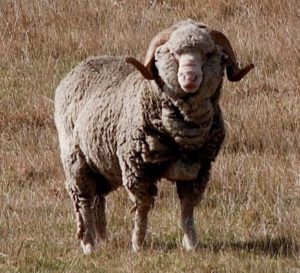 The Dzhalka variety is the result of the breeding activities of livestock breeders in the Stavropol Territory. Having started their work in 1944, to date they have managed to create a variety of sheep that are adapted to steppe conditions and have high productivity in both wool and meat indicators.
The Dzhalka variety is the result of the breeding activities of livestock breeders in the Stavropol Territory. Having started their work in 1944, to date they have managed to create a variety of sheep that are adapted to steppe conditions and have high productivity in both wool and meat indicators.
Breed characteristics:
Reference! Dzhalkinsky merino fully complies with international quality standards and is confidently among the best fine-fleece merino bred in Russia.
In addition to these varieties, the following breeds are popular among sheep farmers today:
Selection research continues, which allows us to expect the emergence of new varieties of the breed.
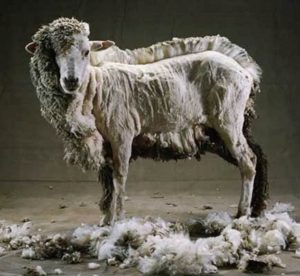 The main advantage of merino sheep is their wool. It is superior to fibers obtained from other sheep, not only in weight, but also in the structure and quality of the fibers, as well as in their properties.
The main advantage of merino sheep is their wool. It is superior to fibers obtained from other sheep, not only in weight, but also in the structure and quality of the fibers, as well as in their properties.
Merino fleece has important qualities.
High thermal insulation. Yarn from elite sheep retains body heat well, provides heat regulation, and guarantees comfortable conditions at low temperatures.
Hygroscopicity. Due to lanolin, which “repels” droplets of moisture, the fibers absorb moisture well, but remain dry even when saturated by 30%. The fibers absorb sweat, leaving the body dry.
No odors. Yarn is also valuable because it does not absorb odors along with moisture. Clothes or bedding made from merino threads do not have unpleasant sweat odors.
Resistant to dirt. The spring-like structure of the fibers gives them the ability to remain clean for a long time.Dirt particles are repelled from the wool threads, the dirt remains on their surface and is easily removed by shaking off.
Strength. Despite the fact that elite threads are several times thinner than other wool fibers, they have increased strength. Things made from such yarn are characterized by wear resistance and durability.
In addition to high quality characteristics, merino threads have valuable properties that have a beneficial effect on human health.
Hypoallergenic. Merino fleece is environmentally friendly. It is provided by steppe or high-mountain pastures, remote from harmful industries. Therefore, their wool does not cause allergic reactions and has no contraindications for use.
Antibacterial. Lanolin covering the threads not only prevents them from getting wet or harmful insects. It is a reliable protection against pathogens and increases the body's defenses.
The dry heat that merino wool creates is one of the remedies for colds or joint diseases. It also has a calming effect, relieves irritation, and helps improve sleep.
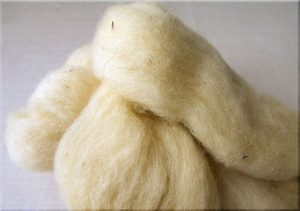 The variety of varieties of the breed and the properties of the fleece of different sheep were appreciated by manufacturers of wool yarn and fabrics. The most popular yarns today are Geelong, Lana, and Italian merino.
The variety of varieties of the breed and the properties of the fleece of different sheep were appreciated by manufacturers of wool yarn and fabrics. The most popular yarns today are Geelong, Lana, and Italian merino.
Sheep grazing near the southern Australian provincial city of Geelong became famous for their fleece. It is considered one of the best on the world market.
Reference! True Geelong is obtained from lambs under 7 months of age.In this case, the first cut is used for Super Geelong yarn.
The age of the sheep makes the threads very soft and thin. The appearance is also noteworthy: its fibers are particularly snow-white.
Another feature is the cross-shaped overlap of wool threads during spinning. This makes the yarn voluminous, warmer and lighter than other varieties.
The inscription Lana merino on the wool packaging means that only merino fleece was used in its production. Regardless of the specific type of yarn, Lana merino has all the properties of merino wool:
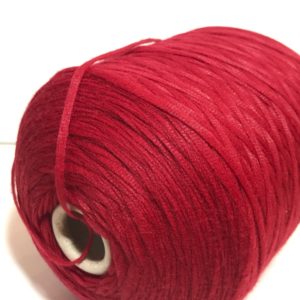 Manufacturers from Italy offer yarn that is ideal for hand and industrial knitting. It is made only from the fleece of high-quality sheep.
Manufacturers from Italy offer yarn that is ideal for hand and industrial knitting. It is made only from the fleece of high-quality sheep.
The most popular varieties of Italian Merino yarn:
In addition to yarn made from 100% merino, Italian manufacturers often use additives: cotton, linen or silk threads.
Merino is a yarn that provides warmth, comfort, and health.